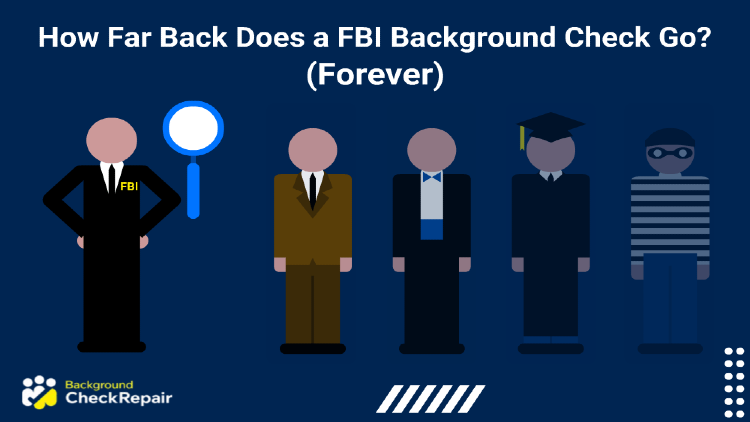
If you need to have a background check or are an employer reviewing criminal history, you may be wondering how far back does a FBI background check go? The answer isn’t as straightforward as you may think.
Technically speaking, the Federal Bureau of Investigation (FBI) keeps its records forever, but the length of time such records can show up on a background check is dependent upon the state. And every state has different laws and regulations concerning the time frame. Keep in mind if you are applying for a position with a federal agency, however, they may not consider state guidelines as they operate at a national level.
The most effective first step is to conduct an FBI background pre-check.
However, knowing the facts about FBI fingerprinting checks (sometimes incorrectly referred to as a level 2 records check), the background check process itself, as well as federal and state laws about the reporting process can help pinpoint exactly how far back an FBI background check will go in your specific case.
How Far Back Does a Fingerprint Background Check Go?
There is a difference between a level 1 check and an FBI fingerprint background check. A basic background check is typically based on a name search with supplemental information such as address, social security number (sometimes), and other identifiers and can be used to determine prior criminal records and to verify personal information, employment history, certifications, and driving records. However, the criminal history record is limited to a single jurisdiction, usually a state.
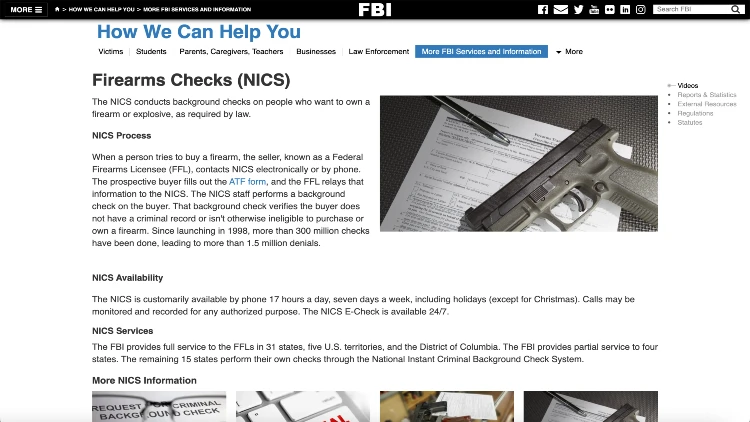
(Image: FBI9)
An FBI fingerprint background search is a search based on an individual’s actual unique fingerprints that can provide national, and sometimes international, criminal history. It will report all personal and criminal records on file within the FBI database.
Because everyone has a unique fingerprint that can’t be falsified, a fingerprint background check has an advantage in that it has a decreased risk of falsification. For both types of checks, the average amount of time records can be looked at goes back seven years.
While 7 years is a generality, many states have provisions that allow the background search to span 10 years.
How Far Back Does FBI Fingerprinting Go? (How Far Back Does Fingerprinting Go?)
Employers within the government sector, such as police departments and the military, and those who work with children, the elderly, or other vulnerable groups of individuals have the legal authority to perform a fingerprint background check, but federal law stipulates that the person who is being searched must provide consent.
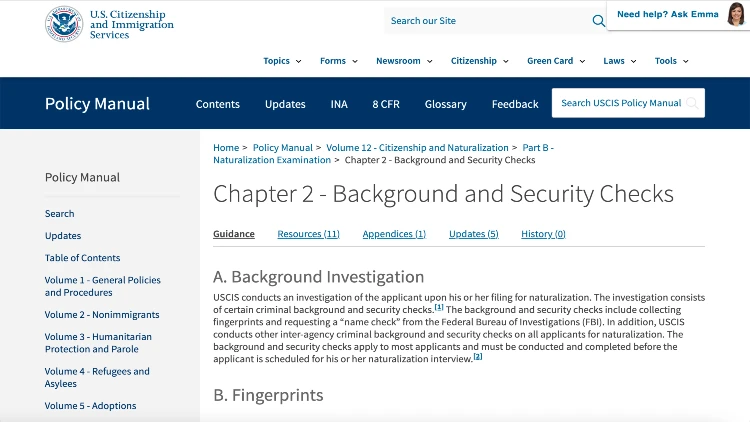
(Image: U.S. Citizenship and Immigration Services12)
A fingerprint check is also required to purchase a firearm and for immigration into the United States.9,12 Professional licenses in certain fields may legally require an FBI background check as well.
Since your fingerprint is yours alone forever, the information the FBI retains on the fingerprint background check can go back forever… essentially as long as you have had your fingerprints.
How Long Does an FBI Background Check Take To Submit and Process? (How Far Back Does an FBI Background Check Go?)
The FBI has made it easy to perform fingerprint background checks using the Identity History Summary check tool online,1 but many people wonder how long it takes for an FBI records check to be completed.
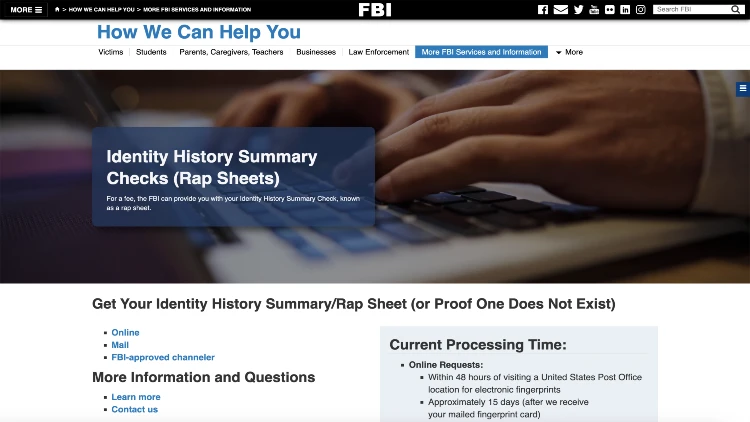
(Image: FBI1)
Current processing time for electronic submittal is 3-5 days (depending on various factors) and for mail-in applications, 2-4 weeks, depending on a number of factors. Follow the steps for a fast-track FBI background screening if you need results in 1 week or less.
To get started, you must submit a request for your fingerprint background check using one of the below methods:5
1. Make the request through an FBI-authorized channeler.11
A channeler is a private firm that has contracted with the FBI to process fingerprint collection and submit the report back to you once completed.
In order to use a channeler, you must be a US citizen or legal, permanent US resident. Channelers may not process a request for employment or licensing purposes.1 Basically, you visit the channeler’s location, where a trained technician will electronically collect and submit your fingerprints. Most requests are processed and the results are received directly from the channeler in three to four days. The advantage of using a channeler is increased accuracy and efficiency since a trained technician is collecting your fingerprints. It also reduces how long the background check takes to return.
2. Request your FBI background check directly from the FBI.
You don’t have to use a channeler; you can directly request your background check from the FBI, either electronically or by mail. Simply complete the Applicant Information Form and obtain a set of your personal fingerprints on the standard fingerprint form (FD–1164).7,10
Once you have ensured that all required documentation and information is completed, mail the forms to the FBI Criminal Justice Information System division.8 You can send via regular mail, though that will increase how long the background check and results will take, or you can send priority mail or overnight shipping. Your results are then sent to you by First-Class Mail through the United States Postal Service.
How Long Does an FBI Background Check Take?
The return time for when you may receive your fingerprint background check results will vary, depending on many factors. Without the use of a channeler, it may take as little as one week or as many as 12 to 14 weeks, especially if there are errors or incomplete information.
The use of print cards instead of electronic fingerprint submissions can result in a less accurate collection that may delay processing and how far back an FBI background check goes.
How Much Is an FBI Background Check?
Many people wonder how much an FBI background check costs. The answer is $18 if you complete the process yourself. However, if you use a channeler that will typically add an additional $50 to the cost. But as mentioned, the use of a channeler does provide the quickest method to receive results and will cut down on any possible mistakes that could delay results even further.
Fingerprint Background Check Results
The FBI uses the Integrated Automated Fingerprint Identification System (IAFIS) to maintain and store fingerprint identification and criminal history… forever.6 Fingerprints acquired through arrest records, background checks, and the US-VISIT (United States Visitor and Immigrant Status Technology) program are cataloged and linked to individuals.
So what emerges from a background investigation by the FBI exactly?
The FBI background check reports personal information, such as name, address, and family, as well as criminal history records based on the individual’s unique fingerprint submissions stored in the database related to arrests, federal employment, military service, and/or naturalization.
Submissions that are related to arrests, also known as a “rap sheet,” will include the arresting agency, arrest date, and disposition of the arrest.1
Current Debate About Background Check Time Frames
Since fingerprinting can go back forever, there is debate on whether or not the FBI background checks are flawed. The Justice Department admits that up to 50% of their background check records are incomplete, without the judgement or dismissal.4 This means that if you need to have an FBI background check completed, it’s a good idea to check it yourself first, to ensure that all of the information is accurate and up-to-date.
Part of the reason for the glaring lack of efficiency is related to where offenses occur and the digital capabilities in those jurisdictions. Due to this, when looking at how far back an FBI fingerprint background check can go, it is important to consider that the summary report may have inaccurate or missing information.
In addition to inaccuracies, the Equal Employment Opportunity Commission(EEOC) has reported that due to disproportionate arrests of minorities, the use of criminal records as an exclusion for hire may have a disparate impact on protected groups.13
Can You Restrict How Far Does an FBI Background Check Go?
The short answer is no, you can’t control what information the FBI retains or investigates, and the FBI fingerprint background check will go back as far as your record does since it is pulling any information in the database based on the fingerprint and not eliminating any records based on when it occurred.
However, the complicated answer is that yes, a standard fingerprint check summary, that searches the FBI database, may provide all criminal history, regardless of when it occurred. Nevertheless, each state can regulate how far back a fingerprint background check may be looked at by potential employers. Because of this, the impact of the background check and your criminal history may vary depending on the employer or situation.
Most states restrict the information to seven years, but others allow a 10-year history to be reported, but only for fingerprint checks. Since an FBI background check is different, there’s no limit on the length of time this sort of security check might examine.
How Far Back Does a Background Check Go?
The Fair Credit Reporting Act (FCRA) only allows reporting of civil suits, judgments, and arrest records for the past seven years or less.2 However, there is no limitation on the reporting of criminal convictions.
Even with no federal limitations on the criminal background check, many states have passed laws to limit how far back the FBI background check can go in the employment decision process. In many states, employers are typically only allowed to consider the past seven years of data on the report for misdemeanor criminal records.
This means that if the background check results in criminal activity reported outside the allowed time frame, it should not be considered part of the hiring process.1 Juvenile records (which are confidential except for cases where the suspect is tried as an adult) and any other court-sealed documents would also usually not be reported on the background check report.
There are some states that allow an extended scope for how far the FBI background check can go, to ten years. In addition, many states have implemented exclusions to the seven-year time frame if the individual’s salary exceeds a certain amount, and in each state, that salary amount varies.
To determine how far back an FBI background check may go, the best option is to research your state regulations.
Does the Equal Employment Opportunity Commission Control Background Checks?
In addition to state laws, the EEOC has also amended its view of Title VII of the Civil Rights Act, expanding it to include discrimination of individuals based on their conviction records.
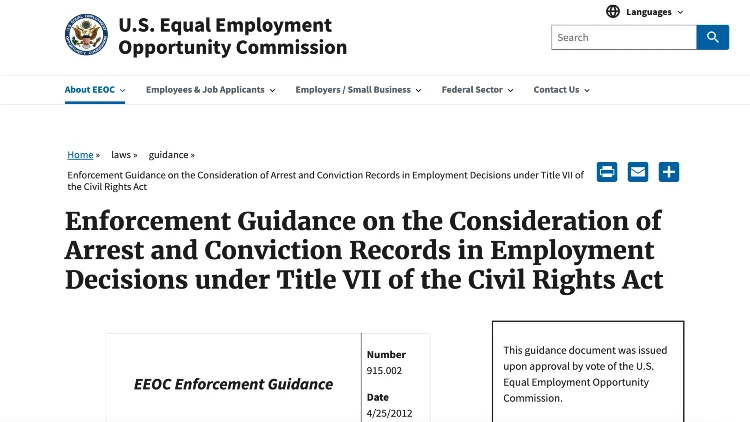
(Image: U.S. Equal Employment Opportunity Commission13)
Moreover, the type of crime committed, how long it’s been since it was done and/or the person served their time, and the nature of the job being considered all establish how far back the FBI background check can go in the employment process.3 However, there are still professions in which individuals with criminal records may be excluded from employment regardless of the time since conviction for certain criminal offenses.
What Is a Fingerprint Clearance Card and How Far Back Does a Fingerprint Clearance Card Go?
A fingerprint clearance card is an identification card that basically says you’ve passed a background check or have no criminal history. They are typically used for certain licenses but are only valid for a specific amount of time.
There is no regulation specifying how long a background check is valid, the card provides a picture of the individual’s history at the time it is requested, and therefore, can change any time after completion.
Employers who work with children, the elderly, or in healthcare may consider conducting FBI background checks periodically on current employees or if an employee is taking on a new role than one they were initially screened for, and any time a license needs to be updated, a new background check is performed.
If an employee has been displaying questionable behavior at work, an employer may also request an updated FBI fingerprint background check to ensure they are still in compliance with company policy and employment requirements.
So… How Far Does a Fingerprint Background Check Go?
If your criminal history record is clean, the question of how far back an FBI background check goes should not be a concern. For individuals with a criminal history, regardless of when it occurred, those offenses may be reported, however, they cannot be used to disqualify you if they occurred beyond 10 years (for most jobs and situations).
Your best resource to determine how far back a background check can go and its impact on you is to look at your state’s laws. But to answer how far back an FBI background check go… the answer is easy… forever.
Frequently Asked Questions






